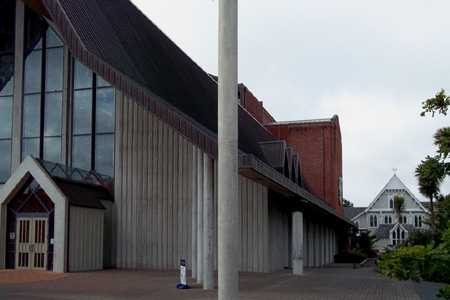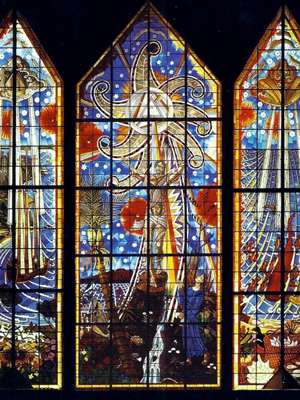| |
 |
 |
 |
| Comment on this report, or find other reports. |
 |
| Our Mystery Worshippers are volunteers who warm church pews for us around the world. If you'd like to become a Mystery Worshipper, start here. |
 |
| Find out how to reproduce this report in your church magazine or website. |
|
|
| 2299: Cathedral
of the Holy Trinity, Auckland, New Zealand |
 |
 |
 |
Mystery
Worshipper: Tukai.
The church:
Cathedral
of the Holy Trinity, Auckland, New Zealand
Denomination:
Anglican
Church in Aotearoa, New Zealand and Polynesia, Diocese
of Auckland.
The building:
The cathedral stands in the suburb of Parnell at the top of
one of the many hills in Auckland (most of which are dormant
volcanoes!) and is visible from much of the city. Like many
other cathedrals, Holy Trinity was built in several stages.
Of the main building, the chancel end (built in the 1950s) is
red brick on the outside but Gothic stone on the inside. The
chancel has remarkably little decoration or stained glass, and
reminded me of one of the plain churches painted by 16th century
Dutch painters. All the decoration went into the nave (built
in the 1990s), which is built in a very contrasting modern style,
essentially as a giant A-frame. The glory of the building is
a magnificent west end of stained glass some 30 metres high.
It comprises three windows, depicting respectively the arrival
of Maori settlers in the 1300s, the arrival of European settlers
in the 1800s, and the awakening of Mary Magdalene and other
women to the resurrection of Jesus. The sides, below the sloping
wood-panelled ceiling, feature no fewer than 18 modern stained
glass windows, with Old Testament themes on the west and New
Testament themes on the east, with the latter in particular
including much Maori symbolism. The wooden pro-cathedral (St
Mary’s, built in the 1860s) stands closely adjacent, having
been moved in the 1970s from its original location by lifting
it off its foundations and transporting it on a large low-loader
lorry!
The church:
Holy Trinity is the centre for Auckland of Tikanga Pakeha (i.e.
the "European" part of the Anglican church). Its worship
services are thus in English, with only occasional words of
Maori. The congregation reflects this division, though it did
include a significant number of New Zealanders of Chinese ancestry.
The neighbourhood:
Parnell is now a rich, leafy, inner suburb of Auckland, which
is the biggest city in New Zealand. The Anglican Church received
large grants of land here in early colonial times, which it
still owns, both around Parnell and around Mission Bay.
The cast:
The Rt Revd Ross Bay, Bishop of Auckland, gave the closing blessing.
Among those leading the service were the Very Revd Jo Kelly-Moore,
dean, and the Venerable Howard Leigh, precentor. An assortment
of laypersons and priests did the various readings. Music was
led by Philip Smith, cathedral organist, and Timothy Moon, director
of music.
The date & time:
27 November 2011, 8.30pm.
What was the name of the service?
Advent Procession with Carols.
How full was the building?
With about 300 in the congregation, the nave was about one-third
full. No one sat in the choir or transepts.
Did anyone welcome you personally?
Yes. A smiling small girl handed us a service sheet at the door.
Was your pew comfortable?
We sat on adequately comfortable chairs, arranged in rows.
How would you describe the pre-service
atmosphere?
Initially quiet , and then the organist played five pieces:
one by Brahms and four by Bach (including "Wachet Auf",
which my musical wife told me even I should recognise, as it
had been played at our wedding!
What were the exact opening words of the
service?
"Drop down ye heavens from above", sung by a solo
soprano as part of the introit.
What books did the congregation use during the
service?
A complete order of service had been specially printed and was
handed out at the door.
What musical instruments were played?
A magnificent organ backed some, though not all, of the choral
anthems. The organ, built by Harrison and Harrison of Durham,
England, is reported to have no fewer than 4309 pipes – I didn’t
count! I did, however, count the choir: it had 28 singers, mostly
young adults.
Did anything distract
you?
In the early stages, I was trying to look at the magnificent
windows, but as darkness fell, this became impossible. There
was a Christmas tree in one corner of the nave, which was perhaps
a bit incongruous. During the introit, I kept looking for a
solo singer in the organ loft, but came to the conclusion that
although the sound came from that direction (in front of us),
it was only a loudspeaker up there, with one of the choir (behind
us at the time) wired for sound. Although there was plenty of
movement in the service, that was by design, so it is unfair
to call it a distraction.

Was the worship stiff-upper-lip,
happy clappy, or what?
Classical English cathedral style, though with adult women rather
than boy trebles singing the high notes. The service sheet accurately
described the service as part of the long Anglican tradition
of vivid Advent services. It also pointed out the symbolism
of the procession moving from liturgical west to east, toward
the brightness of sunrise. Reflecting this symbolism, the electric
lighting increased in brightness and changed colour as the service
progressed. (It was mainly dim purple at the start!) It also
pointed to the antiphons (prayers recited at each stage of the
procession) as part of the monastic tradition, a tradition also
reflected by having three of the anthems sung in the original
Latin (though the service sheet had an English translation as
well). The various priests, the dean in particular, wore what
seemed to my inexpert eye to be full regalia, richly embroidered.
Exactly how long was the sermon?
No sermon.
Which part of the service
was like being in heaven?
The choir sang well throughout, but their unaccompanied rendition
of the complex harmonies of the Byrd anthem Laetentur Coeli
was particularly heavenly. It was sung in Latin, but the translation
given on the service sheet was "Let the heavens be glad
and let the earth rejoice."
And which part was like being in... er... the other place?
The symbolism of the procession to the east end was undermined
for me by the fact that the east end of this cathedral is very
plain (less heavenly?) compared to the nave. It was also a very
long way away from any of the congregation, making the closing
stages of the service seem a bit distant and detached. The time
of the service was dictated by sunset, which is late in December
in New Zealand. Though this did enable the lights to be used
effectively, it had the unfortunate effect of being past the
bedtime of many children, so they were not able to enjoy its
glories – the more so as tens of thousands of children had been
out to see Santa Claus at the annual procession through the
central Auckland shopping district that afternoon. Only one
or two of those present at the service were below voting age
(in my mind because the previous day was a general election
in New Zealand).
What happened when you hung around after the service looking lost?
Given the hour, everyone seemed to be going straight home.
How would you describe the after-service
coffee?
There was none, though there is no shortage of cafes in the
nearby shops for those who wanted a pre-bedtime fix.
How would you feel about making this church your regular (where 10 = ecstatic, 0 = terminal)?
8 – It is hard to judge this question on the basis of a
special service like this.
Did the service make you feel glad to be a
Christian?
Certainly. The message of the coming of Jesus came through clearly.
What one thing will you remember about all this in seven days' time?
The singing. |
|
|
 |
 |
 |
| We rely on voluntary donations to stay online. If you're a regular visitor to Ship of Fools, please consider supporting us. |
 |
 |
 |
| The Mystery Pilgrim |
 |
| One of our most seasoned reporters makes the Camino pilgrimage to Santiago de Compostela in Spain. Read here. |
 |
 |
 |
| London churches |
 |
| Read reports from 70 London churches, visited by a small army of Mystery Worshippers on one single Sunday. Read here. |
| |
|
|
|
|


